Top 25 Worst Sci-Fi And Fantasy TV Shows Ever
TV turkeys we loved to hate
Nobody sets out to make a bad TV show.
And very few shows are without any merit whatsoever (though there are a couple that come near). But sometimes, somehow, it all goes wrong. Maybe the scripts suck. Maybe the casting was all wrong. Often, the ambition severely overawes the budget. Occasionally, it’s a combination of all elements.
So even though there are very few shows that don’t find a fanbase of some sort (even Andromeda !), there are quite a few that are met with overriding derision.
Of course, pinpointing bad TV is trickier than singling out bad movies or books. They’re one-off affairs, whereas TV shows are a series of episodes, sometimes spread over numerous seasons. So you can have shows that start off horrendously, but come good eventually (though in many cases – Outcasts being a recent example – the improvement comes too late). Or decent shows can go seriously off-course into Turkeyville (season two of Buck Rogers In The 25th Century anyone?). We’re not going to include them (though some of the voting panel did think we should make a special case for Torchwood: Miracle Day ) and concentrates on shows that were persistent and consistent offenders.
Admittedly in some cases this is a little unfair as they didn’t get a chance to improve, but hey, they may have grown even worse. We’re just going on the evidence we have at hand.
For your information, this list was compiled in two stages. We started off with a shout-out on Facebook, mainly to make sure there weren’t any serious offenders that we’d forgotten about (and there were). But, truly, this could not be a straight reader vote because when it comes to “worst” lists, that’s open to partisanism (for example. Buffy and Alphas got a good few votes on Facebook, and I don’t think anybody hand on heart could say they really were the worst shows ever).
So then the (sensible) suggestions went to an expert panel comprising the SFX team and various trusted freelancers, and that’s how we arrived at this list.
Sign up to the SFX Newsletter
Get sneak previews, exclusive competitions and details of special events each month!
Sorry if your favourite show ever is on there. But if your favourite show ever is number one… well, Orwell did say that being in a minority of one doesn’t make you mad. But it does make you very, very strange.
The list of doom starts on the next page…
25 The Secret Circle (2011-12)

Adapted from a series of books by the same author who wrote The Vampire Diaries , LJ Smith, it's probably not surprising that The Secret Circle often feels like The Vampire Diaries ' younger, less cool sibling. In fact, it's almost impossible to look at it without comparing it to The Vampire Diaries, seeing as it's basically a re-run with witches instead of vampires. The crucial element that's missing, however, is sex appeal. While The Vampire Diaries positively drips with it, The Secret Circle has cast a group of bland, charmless adolescents (or pretend adolescents) who have all the charisma of a ulcerated bladder. Add to this predictable scripting, naff FX and fake teenage angst and this is one circle that's too square to bother with. Jayne Nelson
24 The Prisoner (2009)

You can forgive AMC for screwing up The Prisoner remake. Not just because, in Breaking Bad and Mad Men the network has two of the greatest TV dramas of all time, but because the original is just so damn peculiar. It'd be impossible to recreate that of-its-time cocktail of ’60s spy-fi, psychedelia, paranoia and flowerpunk weirdness. Instead, the producers of this remake chose to go their own way, while nodding to the original. Unfortunately, they did it in the blandest way possible...
So what went wrong? Well... everything. Portmeirion is an instantly recognisable location. The remake needed a setting with the same curious allure – somewhere that could be half holiday home, half jail. Instead they chose a desert. Okay, sure, it's a more plausible prison, but it hardly sticks in the memory.
Likewise Jim Caviezel is a decent, if bland Number 6, lacking Patrick McGoohan's anarchist temperament and barely suppressed rage. You buy him as a secret agent, but you never feel his bewilderment or pain.
But above all else, it's just... boring. Only Ian McKellen as Number 2 leaves much of an impression. And while the first episode tries clumsily to tie into the McGoohan series, it's hard to reconcile the shows as existing in the same universe.
The curse of a remake is that it will be endlessly compared to the original, doubly so if the original is one of the few TV shows that can be called iconic without fear of hyperbole. The biggest failing of the 2009 remake isn't that it failed to match it – it's that it feels like they didn't even try. Will Salmon
23 Total Recall 2070 (1999)
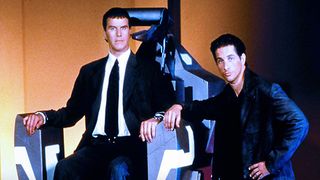
Anyone familiar with the original, fast-paced, action-packed, wryly sardonic Total Recall will sit down to watch this spin-off and realise that something went very, very wrong. If Total Recall is Groucho Marx, Total Recall 2070 is Karl Marx. It's a slow, serious, philosophising psycho-drama, not a balls-to-the-wall actioner... and while this makes it a nice mood piece alongside Philip K Dick's other sci-fi hit Blade Runner , it doesn't make it Total Recall . It's not really good telly either. Although leads Michael Easton and Karl Pruner do their best (the latter having an especially tough task having been given one of the worst “mother-did-it” haircuts in TV history), the show drops you into a world that’s too confusing for casual viewers and too derivative for hardcore fans. Picture a police procedural with a dull android and no excitement and you’re there. Jayne Nelson
22 Jupiter Moon (1990)
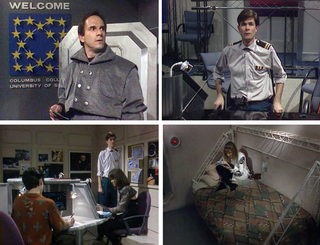
You’d think that a show that lasted 150 episodes must be doing something right – but there’s a catch.
In 1990 the short-lived Galaxy Channel (one of the first satellite channels in the UK) decided it needed a soap opera; something to fill three evenings a week and a Sunday omnibus. Bizarrely enough it picked Jupiter Moon , a series set on a space habitat in orbit of Jupiter’s moon Callisto. The idea was a series featuring normal ordinary folks living normal ordinary lives but have them living in extraordinary surroundings. You’ve got to give Galaxy’s owners, BSB, credit for trying something so radically different.
The show wasn’t disastrously dreadful; there was some pretty bad acting, some terrible fashions and awful special effects. But it had a good mix of drama and teenage angst and it also had some pretty good science and space exploration themes too. The main problem it was pointless: too sci-fi for soap fans, too soapy for sci-fi fans.
The show ran for eight months before the Galaxy Channel folded when BSB merged with Sky, and Jupiter Moon was quietly cancelled. Sky either wasn’t as daring or as stupid as BSB, depending on your point of view. But who knows – in an alternate universe it might still be around today, along with Galaxy . It might have given Coronation Street a run for its money. Space Rover’s Return anyone? Steven Ellis
21 Astronauts (1981)
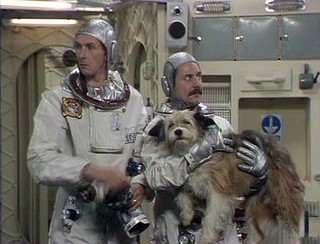
The calibre behind this ITV sitcom is impressive. It’s written by two of the Goodies, Graeme Garden and Bill Oddie, and script edited by the legendary writing duo Dick Clement and Ian La Frenais ( Porridge , The Likely Lads ). Clement even directed the pilot episode.
But somehow, instead of producing comedy gold, there was a colossal reverse-alchemical reaction that resulted in pure lead. Astronauts is dreary, repetitive and bereft of decent gags it’s like being trapped on a train next to a bloke who farts every 30 seconds announcing “better out than in” every time, like it’s the funniest thing ever in history.
A show about Britain’s first three astronauts (so yeah, there’s the posh one, the working class one and the uptight woman) and dog stuck on a space station together, it’s like watching early Red Dwarf with all the decent gags sucked out into the vacuum of space. The characters are extraordinarily unlikeable, the jokes are predicable and the pacing in glacial. Most of the humour comes from the astronauts getting on each other’s nerves, the irony being they never irritate each other as much as they do the audience.
Amazingly, it lasted two series. But then, My Family lasted eleven. Dave Golder
20 Birds Of Prey (2002-2003)
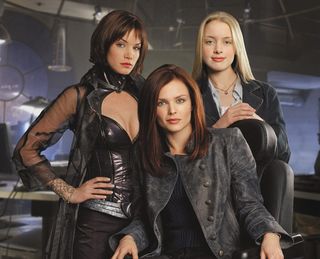
Oh, dear.
This series had such potential. The source material has rich pickings, and the central characters are strong, independent women with interesting backstories and plenty of series potential.
So, what went wrong?
Let’s ignore the continuity issues – that the series takes place outside of DC Comics monthly comics continuity is not a problem. If anything, it could be viewed as a potential strength – after all, by not having to adhere to the continuity of the comics, the series was free to do whatever it needed to ensure the success of the show.
So, what went wrong? Was it the performers?
Well, the cast – though not star-studded – was comprised of talented and experienced actors (Ashley Scott as Helena Kyle/Huntress, Dina Meyer as Barbara Gordon/Oracle, Rachel Skarsten as Dinah Redmond/Black Canary). It’s interesting to note that the one character in the show that came under most criticism (Harley Quinn) was played by one of the most experienced and respected members of the cast (Mia Sara, though Sherilyn Fenn in the pilot).
Was it the direction? The budget?
Perhaps surprisingly, the direction in most of the episodes was reasonably accomplished. The series managed to find a consistent tone, and despite the obvious lack of budget, its production values were solid enough.
What about the writing?
Oh, dear god, yes – the writing! First of all, the writers made a complete mess of the character of Harley Quinn (she’s crazy, yes, but in a bubbly, loveable way – you know she’s going to crush your skull with her mallet, but she’ll be giggling like a loon while she does it – the TV series had her too dark. Why so serious?). It wasn’t just another interpretation of the character – it was a completely different character who just happened to share the name. The writers also appeared to have no idea what to do with any of the other principal characters. Nor how to construct coherent plots, with believable dialogue.
A wasted opportunity. And if you want to see how Birds Of Prey should be handled, pick up any of Gail Simone’s run on the pre-DC 52 series. Lee Harris
19 Gene Roddenberry’s Andromeda (2000-2005)
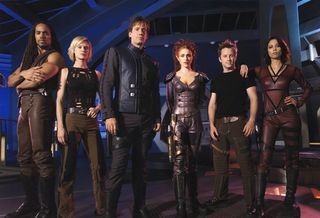
One of the longest-running shows on this list, lasting a full five seasons, Andromeda had serious genre potential. Gene Roddenberry is credited as creator (well, he’s called creator, but it’s just as likely the series was based on a Post-It note he left on the fridge before he died saying, “Must write another series”) and sci-fi stalwart Kevin Sorbo stars as ship’s captain Dylan Hunt, a man who, with his eponymous sentient ship, has been frozen 300 years out of time (hmm, did the Post-It note add, “…Like Buck Rogers”?).
It started as vaguely bearable, but its patchy tone – ranging from intergalactic war epic to some frankly cringe-worthy “comedy” episodes meant by the end of season one it was already outstaying its welcome. The generally passable ensemble ended up being pushed aside in favour of Captain Hunt-centric episodes as the seasons wore on, making for an ultimately disappointing show with a hero so perfect he was dull and often unlikeable. It made Enterprise look like Battlestar Galactica . Perhaps the best comment ever about the show came from Paul Cornell: “Made by a bunch of people who’ve clearly never seen Galaxy Quest .” Narin Bahar
18 Come Back Mrs Noah (1977-8)
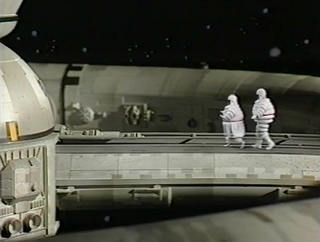
You’d be forgiven for thinking that David Croft could make a successful comedy out of any genre. His list of classic British comedy hits is near unblemished and the subject matter is wonderfully diverse in setting and period: Dad’s Army ( World War 2 Home Guard); Are You Being Served? (department store); It Ain’t Half Hot Mum (World Wars 2 troops entertainers); Hi-De-Hi (’50s holiday camp); You Rang My Lord? (1920s); Oh, Doctor Beeching! (’60s train station), ’Allo ’Allo (World War 2 French resistance); Oh Happy Band (northern town brass band).
But when he turned his talents to science fiction – along with A re You Being Served? and ’Allo ’Allo collaborator Jeremy Lloyd – there was very little to laugh about.
If Astronauts (ITV’s attempt at a sitcom in space) was boring, the BBC’s Come Back, Mrs Noah was just downright embarrassing. Featuring a cast co-opted from other Croft comedies, it starred Molly Sugden as Mrs Noah, a housewife who won a competition to have a look around Great Britain’s new spaceship. And guess what? She’s stuck on board when it accidentally goes into orbit, unable to return home.
The two posh, dim officers from It Ain’t Half Hot Mum (Donald Hewlett and Michael Knowles) are the two posh, dim astronauts, while Ian Lavender (“stupid boy” from Dad’s Army ) is a wet journalist who also gets carted into outer space. And there they have fuzzy-blue-screen-and-Kirby-wire weightless “fun” as Mrs Noah wonders if she ought to cancel the milk and the posh astronauts press the wrong buttons on computers with hilarious results. Comedy “highlights” include a attempts to pee in a wall-mounted loo using magnetic boots.
Honestly, anyone who ever moaned about Red Dwarf season eight didn’t know when they had it good. Dave Golder
17 Kingdom Hospital (2004)
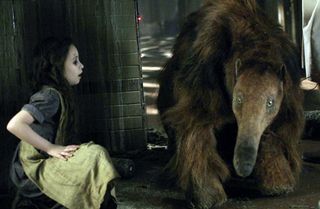
It’s got a logo that looks like it was designed for a nightclub. It’s got ham-fisted characters who you couldn’t give a damn about. And it’s got blue-grey filters over every shot to make you think they went outside when it was dark (but they wouldn’t, because night filming is expensive). And in case you doubted that Stephen King was involved, it’s in Maine, features Spooky Children, and “macabre” horror that just isn’t funny.
Worst of all, it’s mind-numbingly boring. How can anything with a talking anteater be boring? Kingdom Hospital manages it. Thirteen episodes with plot enough for about two, it proves that Stephen King’s writing skills don’t stretch as far – or, indeed anywhere near – drama.
You’re better off watching von Trier’s original, Riget . This sadly is often the way with remakes, but the liberal application of a fine layer of utter nonsense to Kingdom Hospital makes it doubly true here. Troo Topham
16 Manimal (1983)
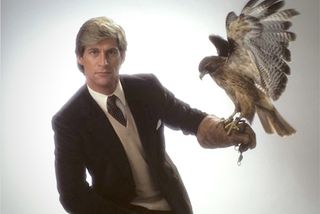
Let's get the good out of the way first, shall we; Stan Winston's Creature Workshop effects are... well, it's Stan Winston, that name alone is the standard of quality on practical effects and has been for years. The rest of the show... did we mention the effects are pretty?*
(* Well, in the pilot, anyway. From there on in it was stock-footage-a-rama. )
Doctor Jonathan Chase has the ability to change into an animal at will and to be very, very English. He's well read, genteel, likes three-piece suits, is trained in multiple killing arts and along with best friend Ty Earl (black, funny, wasted on this material) assists the police in investigating crimes related to Art, Spies, Animals, Being Dreadfully English or whatever the scriptwriters had thrown at the wall that week.
They assisted Police Detective Brooke Mackenzie. who was, for the most part, as effective as you'd expect. After all the series wasn't called Brooke Mackenzie Solves Crimes With The Assistance Of The Only Upper Class English BodyPopper In The World. No, this was Chase's show through and through. Upper class English gent, turns into an animal, fights crime, looks a bit like a blond Piers Brosnan from far enough away, makes pithy comment, roll end credits.
And that would have been fine if not for the fact that the show had no idea what it was supposed to be doing. If it was a detective show it was played so much for laughs that the interesting premise collapsed. If it was a romantic comedy then the romance and the comedy were both largely absent. And if it was a fantasy show then it never had the courage of its convictions. Let's not forget, this is the TV show that doesn't just have an episode called “High Stakes”, set in the world of horse racing and gambling, but felt it had to mention the phrase. “high stakes” in the dialogue of that same episode. Three times. Oh and for a man with the ability to change into an animal, Jonathan was awfully fond of going for a hawk or a black panther. Almost as if they had the stock footage waiting and a deal with the guys who hired out hawks and black panthers...
Manimal was a bad, bad show and not even nice little touches like an unusually subtle crossover with Automan (also dreadful) could save it.
Why Sony could possibly be looking at a Manimal movie is mystifying, unless perhaps, somewhere in the wings, a hawk and a black panther pace, awaiting the chance to stalk the streets, seeking justice while a posh English chaps turns into them, once more... Alasdair Stuart
15 Mercy Point (1999)

ER meet Babylon 5 . As a one-line pitch it sounds like a no-brainer. That’s got to make a good series, right? After all, there were some great episodes of Trek (various incarnations) dealing with sci-fi diseases and body horror.
But there was also Voyager ’s “Threshold” where Janeway and Paris evolve into giants newts and have baby newts.
Mercy Point , sadly, looked like it gained most of inspiration from “Threshold”.
Trite, obvious and cheesy, the medical issues were depressing mundane (the pilot featured a “recapitation” and a computer virus that attacks humans) and the regular characters ham-fistedly carved from purest cliché (yes, there’s an android nurse struggling with burgeoning emotions). There was nothing in this show that hadn’t been covered dozens of times before – and infinitely better – in various “medical” episodes of Trek and Babylon 5 . An utterly pointless, shoddily by-the-numbers, cheap-looking, missed-by-no-one mild irritation in SF history. Dave Golder
14 Painkiller Jane (2007)
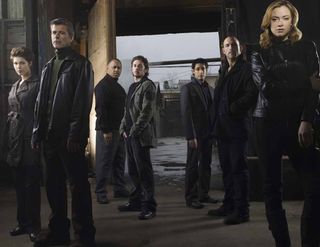
Painkiller Jane tells of a DEA agent (Jane) who discovers a secret agency that hunts genetically super-powered people and “disarms” them by putting a nano-computer chip in their brain. She’s forced to join them, and after being thrown 40 stories off a building on the first mission, finds out that she can heal from any injury very quickly.
But, jeez. This show throws such horrible clichés and shoves flashbacks for the goldfish-brained so hard into your head that you start to wish you could recover from the mental injury being inflicted on you as easily. This may sound like a decent concept to start with, but you soon feel the lack of human empathy; the show has a very one-dimensional idea that the “freaks” are bad, and must be stopped, whereas shows such as Heroes tackled such questions of “difference” with a lot more thought and depth. And when we say Heroes tackled something with a lot more thought and depth, you kind of get an idea of how bad Painkiller Jane must have been.
To top it all off, each episode gets the ears bleeding with intro music that sounds like someone’s scratching a synthesiser along a chalkboard. Luckily, the pain was killed after one season.
13 Shazam! (1974-6)
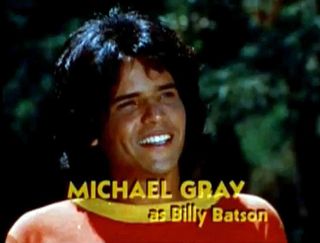
Shazam! And the budget’s gone…
This was an embarrassingly cheap kiddie fare shown as half of The Shazam/Isis Hour . It tells of Billy Batson, who goes around the country in a Winnebago with his mentor… called Mentor. Scriptwriter may have run out of coffee at that point.
By saying “Shazam!”, Billy can turn in Captain Marvel, and beat evil doers. Okay, that’s a straight lift from the DC comics, but in the comics, that was cool and fun (if you were under 11). But the show just seems boring and pointless, as there are never any villains to beat, just thugs and criminals that need to be scared by his ill-fitting cape before the cops come and do all the rest.
At times it feels like the producers spent all their money on the one costume, so they had to make do. Alas, it feels like it’s trying its very best to achieve the ’60s Batman vibe, but never quite got there due to such a lack of wit or style that Batman managed to boast. Combine that with FX that couldn’t trick the blind (seriously, for the flying scenes Captain Marvel would lie on a plank with a fan blowing at him and a sky projected onto a cloth behind him), this show just screams of cheapness, and lacks any of the charm to allow it. Believe us, this isn’t just us gnarly old journos taking the mick out of a show made in simpler times; even kids back in the ’70s knew this was utter crud and switched over to the Banana Splits instead.
12 Sheena, Queen Of The Jungle (2000-2002)

Based on the comic book character Sheena, Queen of the Jungle, which had already enjoyed a popular TV show back in the ’50s, tried to update the character to the 21st century. Well, it tired, but mostly it was game show beauty and Playboy model Gena Lee Nolin running around in a skimpy animal skin dress while protecting the jungle from a series of crap bad guys who threatened the jungle in increasingly tenuous ways. There were some blokes in it too.
For some reason this update decided to look for inspiration from Manimal (never a good idea) by giving Sheena the ability to morph into any jungle creature just by staring into its eyes. She could also transform into a jungle beast woman called the Darak’na by rubbing herself in mud. No really. Still, at least when she was an animal we were spared Nolin’s attempts as acting. Honestly, she was often out-acted by her own costume.
The show got two seasons, totalling 35 episodes, before disappearing off into the jungle and dying like the sick elephant that it was. Steven Ellis
11 Space Precinct (1994-5)
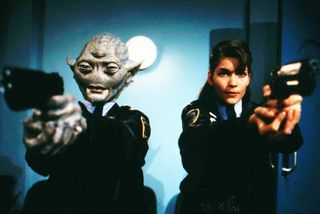
I've no doubt that Gerry Anderson is a genius with a number of hit telly shows under his belt like Thunderbirds , Captain Scarlet and Space: 1999 . Unfortunately Space Precinct is not one of them. “ NYPD Blue in space” is how Anderson described it, jumping on the popularity of the US cop show that launched the year previous. Sadly it’s more like PC Plod in space.
The kind of show Russell T Davies's tone meetings on Doctor Who were invented to prevent ever happening again, S pace Precinct featured episodes that ran the full spectrum of tone and quality – within a single episode . One moment the comedy relief alien cops Orrin and Romek would be playing rock, paper, scissors and stone to decide who will climb into a big bin to rescue a hairy monkey that’s being a nuisance, then cut back to the main story where our clean-cut handsome leads Brogan (Ted Shackleton) and Haldane (Rob Youngblood) are tracking a serial killer and interrogating a prostitute. If the Sixth Doctor had suddenly arrived, crushing a passing pedestrian with his TARDIS and shouting whoops, no one would have questioned it.
The vehicles and explosion effects still look good, and the make-up on the recurring aliens was okay if you could get around how ugly the aliens were. Background aliens, though, were best left in the shadows for fear of exposing budgetary constraints.
In fact, the show was a maelstrom of ambition versus budget. Anderson was aiming for Blade Runner every week (it even had flying cop cars) but the sheer number of FX and models and cityscapes and skylines that the scripts demanded were too much for the tech teams to maintain a quality threshold. (Here’s a fact for you – one skyscraper was a few CD racks glued together and painted silver.) The result were some cartoony effects that often jarred with the attempted realism of the stories, as if somebody were attempting to film Cagney And Lacey In The Night Garden . The poor actors aren't sure quite how to play it, and default to “ham it up” mode.
You could try and enjoy Space Precinct, but it was hard. The suspension of disbelief required was high for even the most hardcore sci-fi fan, even in the mid-’90s when telly sci-fi was sparse. I'm sure I wasn't the only one who watched the adventures of Officer Brogan thinking: he lives on a space station, the police station is another separate space station and his routine patrol is on the planet below - that's one hell of a commute to work. John Cooper
10 TimeCop (1997)
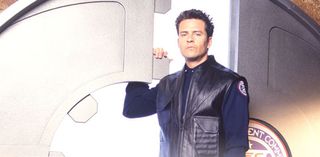
Well, least it has Jean-Claude Van… Damn it, where’d he go?
It’s pretty much everything you’d expect from a spin-off series of the action film TimeCop (not exactly the greatest movie ever, itself). No Van Damme (most likely they couldn’t afford him, but it’s possible even the muscles from Brussels had a quality threshold), bland characters, forgettable bad guys, dire scripts, and rationed FX.
The fact that you probably didn’t even know there was a TimeCop series says it all, really.
9 Logan’s Run (1977-8)
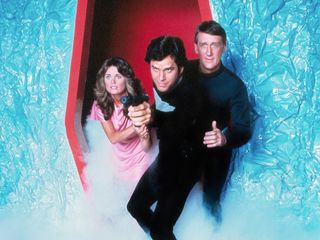
Another TV series version of a hit sci-fi film, the small screen Logan’s Run – unlike TimeCop – at least has some impressive credentials on the writing side. Former Trek writer DC Fontana was the script editor, and she brought a number of Star Trek scribes along with her, including the legendary Harlan Ellison (“The City On The Edge Of Forever”). But it was a bit like getting the London Symphony Orchestra and then getting them to play on dustbin lids and bits of hosepipe.
Forget the film. The producers seemed to. Okay, there was lip service to the film’s themes in the pilot, set in a futuristic city where everyone is culled at the age of 30. Policemen called Sandmen hunt down “runners” people who try to evade the cull. But then a Sandman called Logan starts to question the system and goes on the run himself, with some love interest and doddery android.
After that, from episode two onwards, the whole concept changes to “three dull characters drive around the desert in a converted hovercraft encountering plots Gene Roddenberry thought were a bit too rubbish for Star Trek .” You get aliens, robots, time travel, dream analysers… all the stock storylines of every episodic sci-fi spaceship series just without the spaceship. Tedious. Dave Golder
8 TekWar (1994-6)
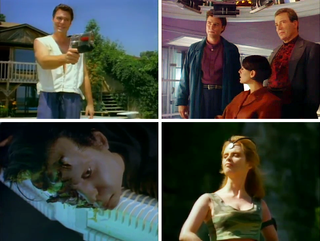
New Wave retro sci-fi soap TekWar is unintentionally funny, but not even in the “so bad it’s good” category. Based on the books “written” by William Shatter (that’s presumably written in the sense of “met the writers for lunch a couple of times”) TekWar started life as four TV movies before spawning a 22-episode TV series of ever diminishing returns.
The premise had Shiner's Walter Bosom, CEO of Security Firm Cosmos, hiring wrongly-convicted cop Jake Cardigan (great name – every show should have a hero named after knitwear) to help hunt down Tec Lords. Tec, yeses, is a kind of future drug, and not a typo for Trek. Any similarities between the words in this franchise’s title and the words in any existing franchise’s title, living or dead, are purely coincidental. Probably.
The ’80s hair and clothing is already dated by the time the show was made (in the ’90s, you’ll note). The theme tune is incomprehensible aural diarrhoea, coupled with an opening sequence which tries to do abusive things to your eyeballs. Actors pause with “futuristic” props, angling them toward the camera while the scene waits for the audience to look at it. Carved from purest cheese, TekWar fails at serious drama, characterisation, visual effects, believability, and ultimately at television.
In its defence, the books were pretty bad too. Basic turf-polishing rules apply. Troo Topham
7 The Starlost (1973)
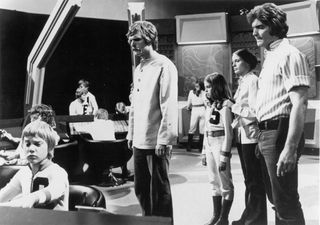
Devised by Harlan Ellison in the ’70s, this show didn’t have a bad original premise, and hell, with Ellison behind it, it should have been good. Set aboard a huge colony spaceship called The Ark, which had suffered some sort of cataclysm years before, the show featured the descendants of the original crew and colonists, who didn’t even know that they are aboard a ship. Gradually they discovered more about their artificial world and the different communities held within it.
Unfortunately the series experienced a number of production difficulties, management compromises, technology failures and budget cuts that effectively killed it before it even aired. The cast made a valiant effort with the material they had, but nothing could save this show.
From a possibly great show, with names such as Ben Bova and Douglas Trumbull involved, The Starlost was turned into a cheap, dumbed-down, by-the-numbers show by TV executives. Harlan Ellison won a Writers Guild of America award for the original pilot scrip; unfortunately the original pilot script was never filmed as it was written, and Ellison is still, to this day, bitter about what became of the show.
Ben Bova has also been very vocal about how disgruntled he was with his time on the show, even going so far as to publish a novel depicting a scientist taken on as a science adviser for a terrible science fiction series, which drew on his memories of working on The Starlost . Steven Ellis
6 Galactica 1980 (Go on, guess…)

After the cancellation of the much-loved original 1979 Battlestar Galactica TV show, fans organised a massive letter-writing campaign to get the show back. Ever heard of the phrase, “Be careful what you wish for”?
This campaign bought the show a reprieve of sorts. ABC decided to revive it, but with a much-reduced budget, forcing Glen A Larson and Donald P Bellisario (who would later create Quantum Leap ) to make some drastic changes. After toying with a time travel aspect they ended up setting the new series 30 years after the original and had the Colonial Fleet discover Earth.
All the original cast were dropped with the exception of Lorne Greene – who instead wore a terrible fake beard presumably in the hope that nobody would recognise him – and Herb Jefferson. Starbuck and Apollo were gone, and gone with them was the space-based drama with Vipers battling Cylons.
Instead what we got were cardboard cut-out heroes Dillon and Troy having fun on Earth with their ridiculous invisible flying bikes. And oh, the kids; the awful, terrible kids… Lots of them. From the incredibly irritating super-powered kids disguised as scouts who are sent by Galactica to Earth, to the awful child genius Doctor Zee (think the Milky Bar Kid with a calculator), this show had more loathsome kids that any other SF show ever.
Fans just wanted the old show back, instead they got Galactica 1980 . Even a late guest appearance by Starbuck couldn’t save this show. It was cancelled after just ten episodes. Steven Ellis
5 Demons (2009)

The BBC proved with Doctor Who 's 2005 reboot that the UK was ready for home-grown, engaging and family-friendly fantasy TV. ITV's first real attempt at dethroning the genre king aimed to combine a smorgasbord of genre influences ( Buffy The Vampire Slayer , Bram Stoker, Merlin , The League Of Extraordinary Gentleman and more) with a starry cast and a weekly dose of kung-fu tactic stunt work.
The actual result, however, typified the mainstream assumption that all you need is an enormous, buzz-erupting marketing campaign and some flashy CGI to keep fantasy fans happy.
Get past the hype and you'd have had to contend with some utterly daft and repeatedly recycled plots, a pantomime tone, some truly woeful character and costume design (the less said about Mackenzie Crook's Mighty Boosh-ish prosthetic snozz, the better), and an array of well-known UK actors suffering from a collective bout of phoneitinitis (Richard Wilson, the aforementioned Crook), and a terminal case of ridonkulous accentius, courtesy of a bizarrely Yankee-afied Philip Glenister.
If the Van Helsings really were alive and well in the modern day, we have a feeling it wouldn't just be vampires they'd want to hunt down. ITV executives, you've been warned. Matt Risley
4 Swamp Thing (1990-93)
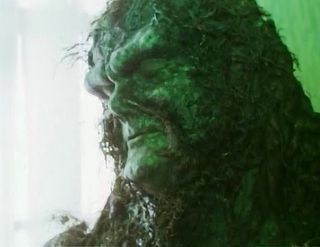
After a modestly successful movie and a terrible sequel, the decision was made to create a Swamp Thing TV show, presumably because the creature suit was available and some people will watch any old crud. What followed was a camp marathon of bad acting, clichéd, disjointed plot lines and lame stories. Episodes were even aired out of order, which caused what little plot there was to make even less sense.
The show was created on a minuscule budget and it shows everywhere, from the terrible effects, fake swamp set and a Swamp Thing suit which seemed so cumbersome that any fast movement or fight scene looked ridiculous.
At least the show didn’t try to take it’s self too seriously, that would have made things even worse. Amazingly enough Swamp Thing has managed to get quite a cult following. This isn’t because it’s so bad it’s good. It’s because it’s so bad it needs to remembered so that it can never happen again. Steven Ellis
3 Krod Mandoon And The Flaming Sword Of Fire (2009)
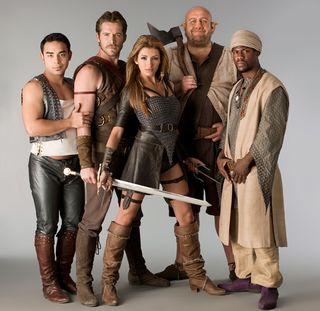
It’s a brave person who names a TV show something so easily nicknamed “crud”. In this case, it was not just brave but also foolhardy.
Pitched as comedy in the vein of Mel Brooks meets The Princess Bride , this short-lived sword and sorcery series’ high faluting aims were somewhat scuppered when it emerged it starred, erm, that bloke off EastEnders and Matt Lucas. The action focused around a rag tag band of freedom fighters, led by the titular Mandoon, and whose sole female recurring character was Aneka, a pagan warrior who used sex as her weapon, in cringeworthy “comedy” fashion.
Whether you’ll enjoy the humour can pretty much be predicted by whether you laugh at jokes about masturbation, dogs sniffing their balls and the ruler of the land being called Emperor Xanus (the x is pronounced as a “Z” – say it quickly). Reassuringly most people apparently don’t, and the show didn’t get picked up for a second series.
Interestingly, the Wikipedia entry for Krod still says “2009 to present”. This could mean the show’s fans are hopelessly optimistic. Or it could mean the show didn’t have any fans who cared enough to edit the entry. What do you think? Narin Bahar
2 Crime Traveller (1997)
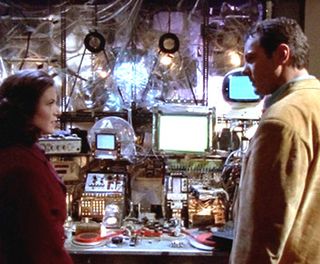
Undoubtedly, part of Crime Traveller 's bad reputation comes from what it's not. In 1997 Doctor Who was recovering from its drunken one-night stand in America. The TV movie had come and gone, leaving a TARDIS-shaped hole in the hearts of British viewers. The BBC tried to fill that gap with this risible time travel cop show. We wanted the real thing back!
Putting fan bitterness aside, Crime Traveller is still diabolical. Everything about it screams of British TV's mid-’90s timidity, from the soap opera casting (smarmy ex- EastEnder Michael French and Sue Johnston in full-on shouty matriarch role) to the parochial nature of most of the crimes. Slade is, predictably, a maverick detective who uses unorthodox methods to get results (it'd be nice if, for once, there was a series about a detective who uses entirely routine methods to get results) while his companion, scientist Holly, spends most of the series looking alternately hacked off or bored.
Worst of all for science fiction fans, the rules of time travel made no sense. We've summarised the problems before, but they are so awesomely ill-thought-out it’s always worth highlighting them again for a laugh:
• The time machine never travels into the future because, “You can’t travel into something that doesn’t exist.”
• The machine sends the travellers back a random amount of time, usually around a day, but maybe just a few minutes or as much as a week. But once you’ve been sent back, you have to live that amount of time again. And when that time is up, you have to be back at the machine, or you get stuck in a time loop.
• You must not meet yourself in the past or change the past. It’s never clear what’ll happen if you do. Create a more interesting programme presumably.
• Also never explained is why, if you need to be back at the machine at the same time you first travelled back, the characters never meet themselves using the machine to go back in time. The answer may be as simple as: because the show was bollox.
Despite all this, Crime Traveller did reasonably well for the BBC, with all eight episodes achieving decent ratings. Alas for Jeff Slade, a curly-haired chap by the name of Jonathan Creek was just weeks away from making his debut. The success of that show, combined with the arrival of a new Head Of Drama, and writer Anthony Horowitz's own admission that he found it a tough show to write, meant that the crime traveller travelled no more. Will Salmon
1 Flash Gordon (2007)
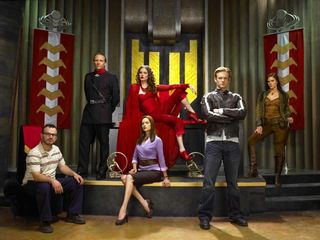
When the most recent TV incarnation of Flash Gordon was first announced it was pitched very much as a contemporary version of a much-loved comic in the vein of Smallville , complete with alumni Eric Johnson in the titular role.
What we ended up with was a multi-universe Dawson’s Creek, with a side order of terrible CGI. The space opera adventures were replaced with budget-friendly dimensional gates which transported characters from a bit of America that looked suspiciously like a Canadian forest to a bit of Mongo that looked suspiciously like a Canadian forest.
The various realms of Mongo – so gloriously weird and wonderful and lurid in the comics and the 1980 film – are here all cheesy outfits, wobbly scenery and ropey green screen. The dialogue and acting was so painful to endure that you at times you’d rather pull off your own ears and use them as a blindfold to ensure you didn’t have to see or hear anything more. The Hawkmen were de-winged; instead the actors flapped their cloaks and bobbed up and down like flashers desperate for the loo. The worst episode concerned a disease which would kill you if you became too happy; sadly the resolution didn’t involve the characters discovering that watching an episode of their own show was an antidote that would last a lifetime.
Annoyingly, while it started out so bad, it was funny, about halfway through the first season it discovered a level of dull-almost-competence that actually made it even more unwatchable.
They even ditched the Queen soundtrack.
There are no redeeming features here at all. None. Narin Bahar

Dave is a TV and film journalist who specializes in the science fiction and fantasy genres. He's written books about film posters and post-apocalypses, alongside writing for SFX Magazine for many years.
Most Popular



